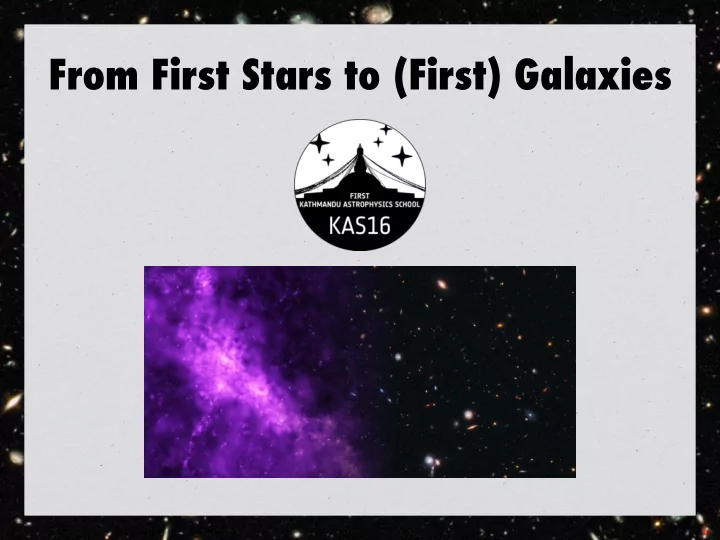

From First Stars to (First) Galaxies
KAS16/MT Lecture IV - DarkLight 2
KAS16/MT Lecture IV - DarkLight 3
KAS16/MT Lecture IV - DarkLight 4
T [K] n [cm -3 ] Smith et al. (2009) KAS16/MT Lecture IV - DarkLight 5
KAS16/MT Lecture IV - DarkLight 6
A model for galaxy formation ★ Goal: Simplest meaningful model to understand evolution of galaxy formation ★ Galaxies form within dark- matter halos • Working hypothesis: Dark matter halo assembly main driver of star formation KAS16/MT Lecture IV - DarkLight 7
Our model for LF evolution ★ DM halos populated by galaxies with UV luminosity L(M h ,z) ★ L(M h ,z) depends on: 1. Stellar populations [young stars brighter]: Age(M h ,z) 2. Stellar mass: M star (M h ,z) L(M h ,z) ~ M star /Age [with constant star- formation history ] KAS16/MT Lecture IV - DarkLight 8
Galaxy ages ★ Adopted galaxy “age”: DM halo assembly time Halo assembly time M h /2 M h ★ Rapid high-z assembly ★ No free parameters Tacchella, Trenti & Carollo (2013) [MSc project] KAS16/MT Lecture IV - DarkLight 9
From halo to stellar mass ★ Minimal assumption: Stellar mass does not depend on redshift: M star (M h ,z) ★ M star (M h ) derived from single redshift log(M star /M h ) calibration Halo Mass [log M sun ] KAS16/MT Lecture IV - DarkLight 10
From halo to stellar mass ★ Minimal assumption: Stellar mass does not depend on redshift: M star (M h ,z) ★ M star (M h ) derived from single redshift log(M star /M h ) calibration ★ Luminosity defined at all z : Halo Mass [log M sun ] KAS16/MT Lecture IV - DarkLight 11
Luminosity function evolution Tacchella, Trenti & Carollo (2013) [MSc project] KAS16/MT Lecture IV - DarkLight 12
Luminosity function evolution Tacchella, Trenti & Carollo (2013) [MSc project] KAS16/MT Lecture IV - DarkLight 13
Luminosity function evolution ★ Model successful from z=0 to z=10! ★ Assumptions validated! Tacchella, Trenti & Carollo (2013) [MSc project] KAS16/MT Lecture IV - DarkLight 14
Luminosity function evolution ★ Validation from latest z ~ 8-10 data ★ And predictions for z>10 [first 500 Myr] Mason, Trenti & Treu (2015) KAS16/MT Lecture IV - DarkLight 15
Stellar mass density evolution ★ Modeling based on galaxy light only ★ Yet… Evolution of Predictions stellar mass density described extremely well Observations ★ Further confirmation that basic model captures essence of galaxy evolution Mason, Trenti & Treu (2015) KAS16/MT Lecture IV - DarkLight 16
Star formation history ★ Drivers of star ] -3 c More halos formation: p M -1 r y ★ Halo mass function M sun evolution [ e t (galaxy abundance) a r n Increased halo o i t assembly time a ★ Halo assembly time m r o f (galaxy age) r a t S g o L Trenti et al. (2013) KAS16/MT Lecture IV - DarkLight 17
Summary ★ Dark Matter halo assembly key driver of star formation ★ Basic model reproduces the evolution of the star formation history ★ Halos at fixed mass at different redshift have similar stellar mass, but different luminosities because galaxy ages change KAS16/MT Lecture IV - DarkLight 18
Recommend
More recommend